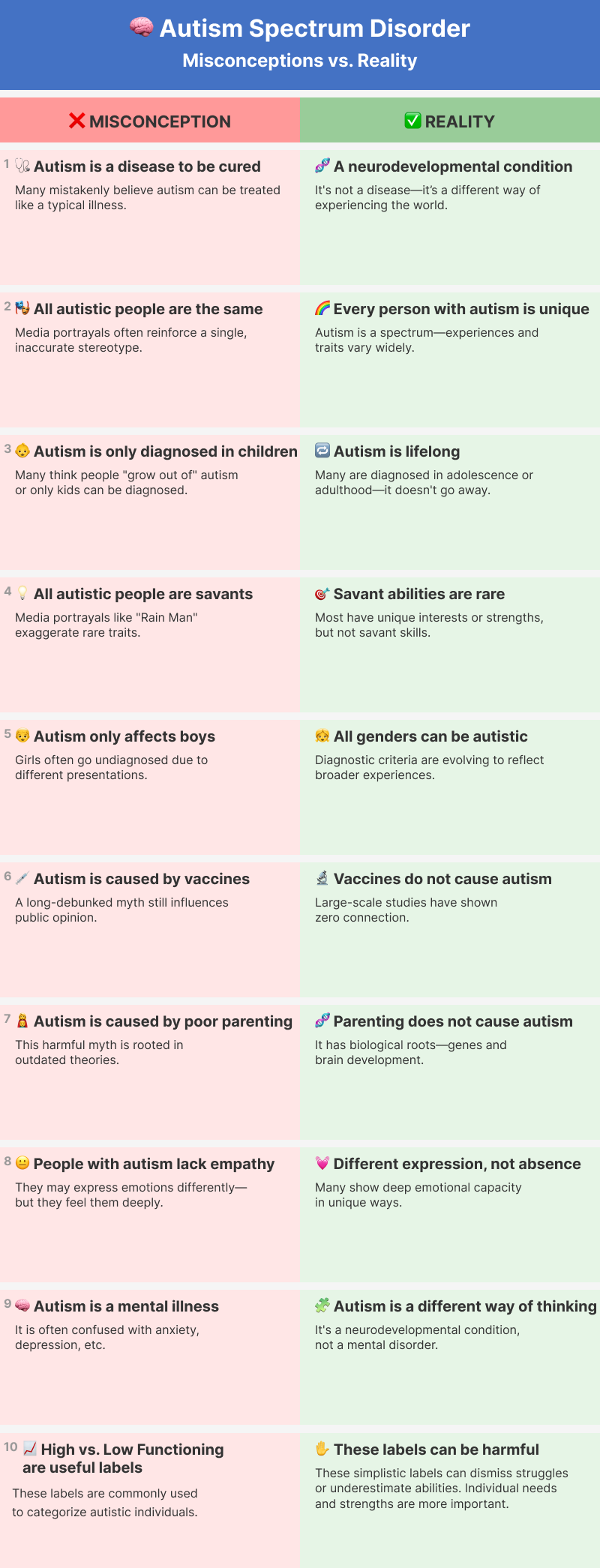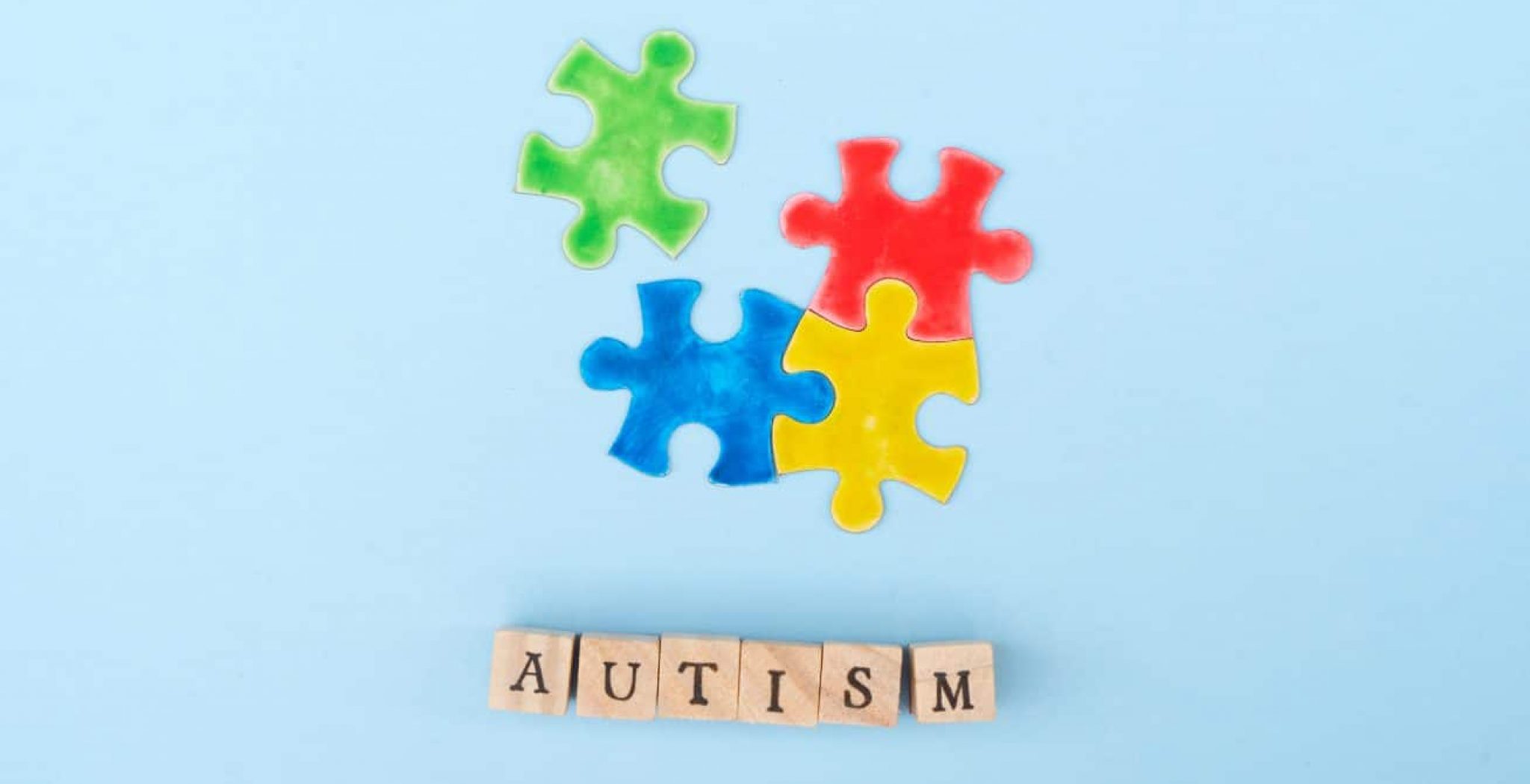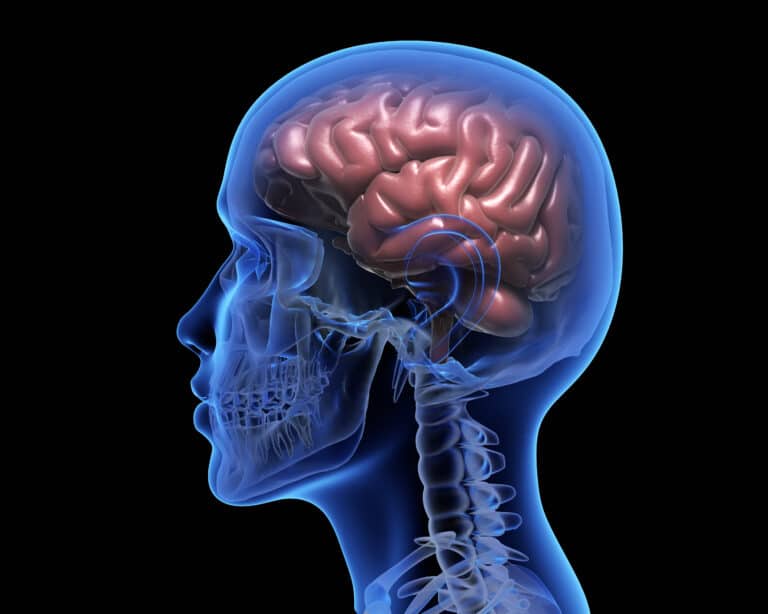Understanding Autism Spectrum Disorder
April is Autism Awareness Month, a time to increase understanding, acceptance, and support for individuals on the autism spectrum. At Southern California Sunrise Recovery Center, we recognize the importance of promoting accurate information about autism spectrum disorder (ASD) while challenging harmful misconceptions that can lead to stigma and discrimination.
Autism spectrum disorder is a neurodevelopmental condition that affects how people perceive the world, process information, and interact with others. As the Autism Association of Western Australia notes, “Autism is a neurodevelopmental condition” rather than a mental health or behavioral disorder. The term “spectrum” reflects the wide range of strengths, challenges, and experiences of individuals with autism.
Current prevalence data shows that autism now affects 1 in 36 children in the United States, representing a significant portion of our population. This increase in diagnosis over the years reflects our improved understanding and identification of autism rather than an “epidemic” or crisis.

Challenging Common Misconceptions About Autism
Misconception 1: Autism is a Disease That Needs to Be Cured
Reality: Autism is not a disease. As One Central Health explains, “Autistic people are definitely not ill. Autism cannot be cured with medicine. In fact, the word ‘cured’ doesn’t even factor into the discussion!” Autism is a different way of experiencing and interacting with the world, not something that needs to be “fixed.”
Instead of focusing on a “cure,” we should work toward understanding, accommodation, and support that helps autistic individuals thrive in a world that isn’t always designed for their ways of thinking and processing. At Southern California Sunrise, we focus on mental health support rather than trying to “fix” neurodevelopmental differences.
Misconception 2: All Autistic People Are the Same
Reality: Every person with autism is unique and has different abilities and interests. As Dr. Stephen Shore famously said, “If you’ve met one individual with autism, you’ve met one individual with autism.” The autism spectrum encompasses an incredible diversity of experiences, strengths, and challenges.
Some autistic individuals may need significant support in daily living, while others may live independently. Some may have exceptional abilities in certain areas, while others may face more challenges. The spectrum is vast and varied.
Misconception 3: Autism is Only Diagnosed in Children
Reality: Autism is lifelong. In fact, in the UK there are more autistic adults than children. While many individuals are diagnosed in childhood, others may not receive a diagnosis until adolescence or adulthood, particularly those who developed coping strategies that masked their autistic traits.
Understanding that autism continues throughout life is crucial for providing appropriate support at all life stages.
Misconception 4: All Autistic People Have Savant Abilities
Reality: The percentage of autistic people with savant abilities, or extraordinary skills, is only about 10%, according to the Autism Research Institute. Media portrayals often focus on characters with exceptional abilities (like in the movie “Rain Man”), but this represents only a small portion of the autism spectrum.
Most autistic individuals have specific interests and strengths, but not necessarily at a savant level. These interests can be valuable assets and sources of joy, connection, and potential career paths.
Misconception 5: Autism Only Affects Boys
Reality: Many autistic women are going undiagnosed or misdiagnosed. One explanation is that girls are socialized into masking their autistic traits, leading to different presentation. While current diagnosis rates show more males than females, this gap is closing as we better understand how autism may present differently across genders.
Research suggests that diagnostic criteria have historically been based primarily on how autism presents in males, potentially missing many females on the spectrum who may express their autism in ways that don’t fit the traditional model.
Misconception 6: Autism is Caused by Vaccines
Reality: The biggest myth of all is that vaccines, specifically the MMR vaccine, cause autism. High-quality research studies involving hundreds of thousands of people have consistently shown that vaccinations do not cause autism. This misconception, stemming from a discredited study, has been thoroughly debunked by extensive scientific research.
Misconception 7: Autism is the Result of Poor Parenting
Reality: Autism is not caused by bad parenting. Research has proved that parenting is not to blame. Autism has genetic and neurological origins and is not caused by parenting styles or choices.
Supportive parenting can certainly help autistic children navigate the world more effectively, but parents do not cause autism.
Misconception 8: People with Autism Lack Empathy or Emotions
Reality: Differences in non-verbal expression sometimes lead neurotypical people to believe that we don’t experience emotional responses at all – but they’re there, even if you can’t see them. In fact, more recent research proposes that these traits may be due to excess of empathy rather than lack of it.
Many autistic individuals experience deep emotions and empathy but may express them differently or become overwhelmed by them. Understanding these different ways of expressing and processing emotions is key to building meaningful connections. Our psychotherapy services help individuals develop emotional awareness and expression.
Misconception 9: Autism is a Mental Illness
Reality: “Autism isn’t an illness at all,” as Dr. Cuffman explains. “It’s just the way your brain works.” ASD is a neurodevelopmental disorder, which means something about brain development and function is different from that of a “typical” child. While some mental health conditions can co-occur with autism, autism itself is not a mental illness. We offer psychological evaluation and diagnosis to help identify co-occurring conditions.
Misconception 10: High-Functioning vs. Low-Functioning are Useful Labels
Reality: The autistic spectrum is so much more diverse than that; whilst some need more support than others, we all have our own strengths and weaknesses and no two people are the same. These simplified labels can be harmful, often leading to people labeled “high-functioning” having their struggles dismissed and those labeled “low-functioning” having their abilities underestimated.
It’s more helpful to understand each person’s specific support needs, challenges, and strengths rather than applying these broad, potentially limiting labels. This individualized approach is similar to how we approach CBT therapy and other behavioral therapies.
The Shift Toward Acceptance: From Awareness to Action
In recent years, there has been a meaningful shift from merely raising awareness about autism to fostering genuine acceptance and inclusion. As noted by CSI Companies, “By making small shifts, like embracing different communication styles, advocating for sensory-friendly environments, and challenging misconceptions, we create a world where everyone can succeed.”
This shift is reflected in the evolution of terminology from “Autism Awareness Month” to “Autism Acceptance Month,” which many organizations and autistic self-advocates now prefer. At Southern California Sunrise, we incorporate these principles in our approach to all behavioral disorders and personality disorders.
Supporting Individuals with Autism Spectrum Disorder
Understanding Individual Needs
Each person with autism has unique strengths, challenges, and preferences. Taking the time to understand an individual’s specific needs and communication style is essential for providing meaningful support. Our behavioral therapy approaches are always personalized to individual needs.
Creating Supportive Environments
Making adjustments to physical environments to accommodate sensory sensitivities can significantly improve comfort and reduce stress for many autistic individuals. This might include:
- Reducing harsh lighting or loud noises
- Providing quiet spaces for breaks
- Being flexible with routines and expectations
- Using clear, direct communication
Our holistic therapy programs incorporate sensory-friendly practices.
Promoting Inclusion
True inclusion means valuing neurodiversity and recognizing the unique perspectives and contributions of autistic individuals. This involves:
- Challenging stereotypes and misconceptions
- Advocating for accessible education and employment opportunities
- Listening to and amplifying autistic voices
- Creating spaces where differences are celebrated rather than merely tolerated
These principles align with our approach to mental health awareness throughout the year.
How Southern California Sunrise Recovery Center Can Help
At Southern California Sunrise Recovery Center, we understand that many individuals with autism spectrum disorder may also experience co-occurring mental health conditions such as anxiety, depression, or trauma. Our comprehensive approach to mental health includes:
- Individualized treatment plans that consider neurodevelopmental differences
- Sensory-friendly therapeutic environments
- Specialized support for adults with autism and co-occurring mental health conditions
- Family education and support programs
- Connection to community resources for ongoing support
Our dual diagnosis treatment is particularly valuable for those with autism and co-occurring mental health conditions.
Take the First Step Toward Understanding and Support
If you or a loved one is experiencing mental health challenges alongside autism spectrum disorder, our compassionate team at Southern California Sunrise Recovery Center is here to help. We provide specialized support that respects neurodiversity while addressing mental health needs.
Contact us today at 949-284-7325 to speak with our admissions team about how our programs can help you or your loved one find a path toward improved mental health and wellbeing. We accept most major insurance plans and can verify your benefits quickly.
Additional Resources
- Autism Society of America
- Autistic Self Advocacy Network
- Autism Speaks
- National Institute of Mental Health – Autism Resources
References
- Autism Association of Western Australia. (2022). Common Misconceptions. https://www.autism.org.au/what-is-autism/common-misconceptions/
- The White House. (2025). World Autism Awareness Day, 2025. https://www.whitehouse.gov/presidential-actions/2025/04/world-autism-awareness-day-2025/
- CSI Companies. (2025). Celebrating Our Differences: Autism Acceptance Month 2025. https://csicompanies.com/celebrating-our-differences-autism-acceptance-month-2025/
- One Central Health. (2020). 10 Myths About Autism Spectrum Disorder. https://www.onecentralhealth.com.au/autism/10-myths-about-autism/
- Sarah Dooley Center for Autism. (2023). Dispelling Common Misconceptions About Autism. https://www.sarahdooleycenter.org/news/common-misconceptions-about-autism/
- Autistica. (2018). Myths and causes – Autism. https://www.autistica.org.uk/what-is-autism/autism-myths-and-causes
- Cleveland Clinic. (2024). Vaccines and Autism: Common Myths & Misconceptions. https://health.clevelandclinic.org/autism-myths-and-misconceptions
- Ambitious about Autism. (n.d.). 10 misconceptions about autism. https://www.ambitiousaboutautism.org.uk/about-us/media-centre/blog/10-misconceptions-about-autism
- Autism Spectrum Australia (Aspect). (2023). Common myths about autism. https://www.aspect.org.au/blog/common-myths-about-autism






